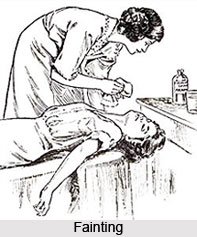 Syncope or fainting is a term applied to a temporary loss of consciousness. Loss of consciousness is interruption of one`s awareness of self and surroundings. When loss of consciousness is temporary and recovers spontaneously it is referred to as fainting or syncope. Temporary loss of consciousness, or syncope, has been reported to account for three percent of patient visits to emergency departments.
Syncope or fainting is a term applied to a temporary loss of consciousness. Loss of consciousness is interruption of one`s awareness of self and surroundings. When loss of consciousness is temporary and recovers spontaneously it is referred to as fainting or syncope. Temporary loss of consciousness, or syncope, has been reported to account for three percent of patient visits to emergency departments.
Temporary loss of consciousness is a result of a temporary reduction in the blood flow and eventually oxygen to the brain. This can lead to lightheadedness or a `black out` episode of loss of consciousness. There are many conditions that can temporarily impair the brain`s blood supply.
Causes and Symptoms: There may be a sudden diminution of blood supply to the brain, which may cause fainting. A powerful emotion, like the news of the death of a dear one, and also sometimes, great joy, may cause a person to faint. Severe pain due to serious injury in a road accident may result in loss of consciousness as well. Getting up suddenly from bed after a prolonged period of illness, standing for a long time, disgusting smells and sights, as for example a butcher killing an animal, and general exhaustion are also some of the causes of fainting.
Sushruta has categorized syncope into seven classes depending upon whether it originates from the vitiation of the three doshas, blood disorders, alcoholism, or the ingestion of poison into the system. Charaka, however, is of the view that syncope is of four types. Three resulting from the vitiation of the various doshas, and the last one is a combination of all the three doshas. Fainting may also be due to a vasovagal attack, which results when the venous return of the blood is not maintained.
Medicines & Prescriptions: If the syncope becomes frequent even after removing the somatic causative factors, the following course of treatment is advised:
1. Murchhantaka Rasa: 240 mg to be taken in the morning and evening with honey.
2. Chandravaleha: 10 gm to be taken with cow`s milk at breakfast.
Diet and Other Regimen: A person subject to frequent syncope should avoid intoxicating drinks. Soft, easily digestible food is often recommended. Some freehand exercises including morning and evening walks, pleasant surroundings, freedom from worry, and an easy way of life are recommended. Violent exercise is forbidden. Those with a tendency towards introversion should turn to their friends and relatives so that they do not brood over their problems. Such patients should also see that they do not suffer from constipation. A mild purgative may be taken if constipation develops.




















